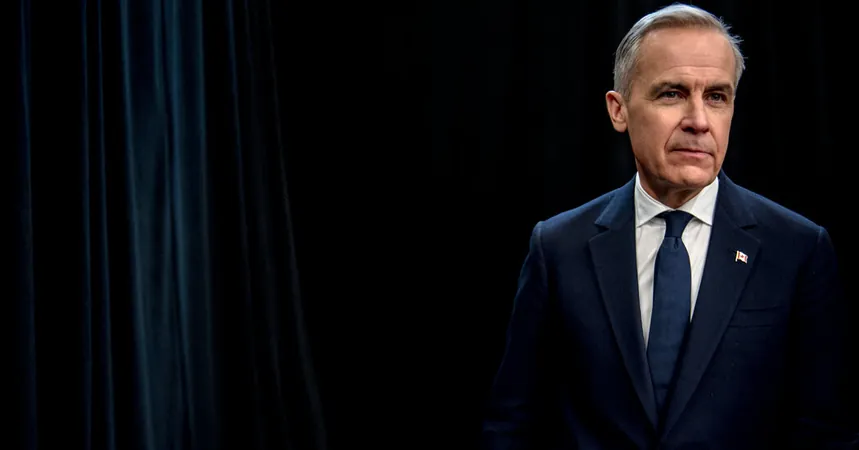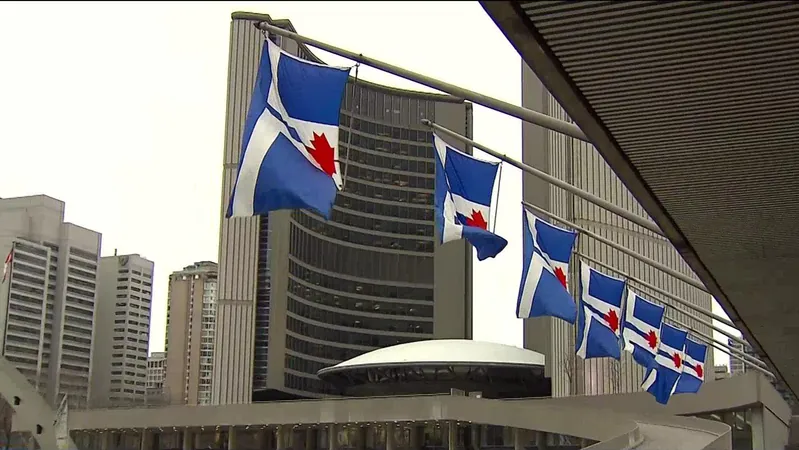
Can Mark Carney Steer Canada Towards a New Era as He Aims for Trudeau's Crown?
2025-03-07
Author: Benjamin
As the summer of 2007 unfolded in Canada, high-ranking officials within the finance ministry were acutely aware that a global financial eruption was looming. Mark Carney, who was then a senior public servant, recalls the uncertainty: “We knew that the thing was going to fall apart.” This pivotal moment marked the beginning of Carney's journey through the tumultuous waters of economic crisis management as he later ascended to the roles of governor of the Bank of Canada and the Bank of England.
For Carney, the financial turmoil didn’t just present challenges; it reshaped his political perspective. Witnessing the erosion of public trust in Western institutions during the crisis, he emphasized at a research group meeting in Ottawa recently, “People were betrayed by the system. How do you rebuild that trust?” This question now echoes within the halls of Canada's Liberal Party, which finds itself in a precarious position following nearly a decade in power.
As the Liberal Party seeks new leadership, Carney has stepped forward, positioning himself as the solution to revive the party's fortunes as it faces a leadership contest set for Sunday. The political landscape has shifted dramatically since Prime Minister Justin Trudeau's resignation announcement just two months ago. Issues such as immigration and inflation, which contributed to Trudeau's declining popularity, have been further complicated by the volatile actions of U.S. President Donald Trump, who recently enacted temporary tariff reversals but indicated ongoing hostilities towards Canada.
Voters are recognizing Carney's impressive economic credentials and composed demeanor as assets in confronting Trump's unpredictable policies. However, his tenure as prime minister may be ephemeral, considering that the Liberal Party does not control a majority in Parliament. Should he assume leadership, Carney would need to navigate the complexities of calling an early election, which could take place by October.
Despite this opportunity, Carney's approach to Trump remains cautious. He refrained from discussing Trump’s policies, believing it would send “conflicting signals” during the ongoing negotiations led by Trudeau. In stark contrast, Deputy Prime Minister Chrystia Freeland has adopted a more aggressive stance, promising a dollar-for-dollar punitive response against U.S. tariffs.
Adding to Carney's challenges are perceptions regarding his privilege and disconnect from the everyday struggles faced by Canadians. His extensive educational background, including degrees from Harvard and Oxford, and his ascent in the financial world with positions at Goldman Sachs and the World Economic Forum, paint a picture of a global elite. Yet, he argues that his expertise in finance could be a catalyst for attracting private investments and addressing Canada's long-standing productivity concerns.
“I’m not a politician,” Carney asserted in his recent campaign messaging, citing his prior experience within the finance ministry during both a Liberal and a Conservative administration. He became a prominent figure in the UK as governor of the Bank of England from 2013 to 2020, steering the country through the Brexit crisis, though not without controversy. Critics noted his warnings about Brexit's potential economic fallout were often perceived as politically charged, and some argued he exaggerated his influence during the 2008 financial crisis.
As Carney seeks to differentiate his platform from Trudeau's, he has garnered support from current Liberal MPs. However, he faces the challenge of convincingly conveying that he represents a new direction for the party while managing his historical ties to Trudeau. His recent role as a special economic advisor under Trudeau is seen by some as largely ceremonial, with observers like Canadian business leader Evan Siddall commenting that it offered limited actual impact.
In terms of policy, Carney's proposals mark a significant shift from Trudeau’s approach. He aims to scrap the unpopular carbon tax in favor of an industrial pricing system that incentivizes large polluters while also rewarding consumers for reducing their carbon footprints. His climate strategy emphasizes promoting a transition to green energy, a choice that demonstrates both ambition and sensitivity given Alberta's deep reliance on oil and gas industries.
In a time of uncertainty, the question looms: will Canadians embrace Mark Carney as the leader who can rekindle their trust in government and navigate the country's economic challenges? As the political landscape continues to evolve, all eyes will be on Carney to see if he can indeed steer Canada towards a promising new era.









 Brasil (PT)
Brasil (PT)
 Canada (EN)
Canada (EN)
 Chile (ES)
Chile (ES)
 Česko (CS)
Česko (CS)
 대한민국 (KO)
대한민국 (KO)
 España (ES)
España (ES)
 France (FR)
France (FR)
 Hong Kong (EN)
Hong Kong (EN)
 Italia (IT)
Italia (IT)
 日本 (JA)
日本 (JA)
 Magyarország (HU)
Magyarország (HU)
 Norge (NO)
Norge (NO)
 Polska (PL)
Polska (PL)
 Schweiz (DE)
Schweiz (DE)
 Singapore (EN)
Singapore (EN)
 Sverige (SV)
Sverige (SV)
 Suomi (FI)
Suomi (FI)
 Türkiye (TR)
Türkiye (TR)
 الإمارات العربية المتحدة (AR)
الإمارات العربية المتحدة (AR)